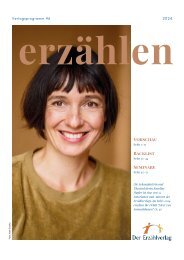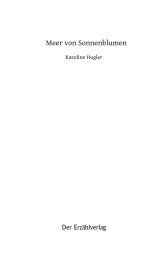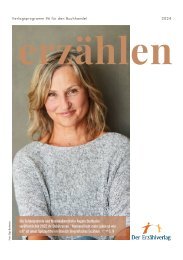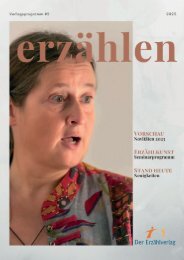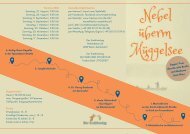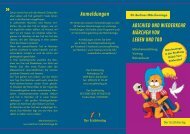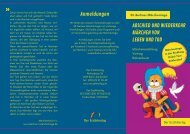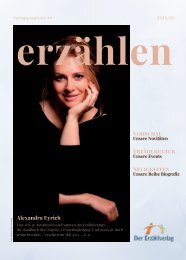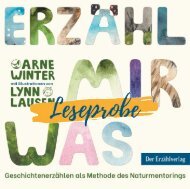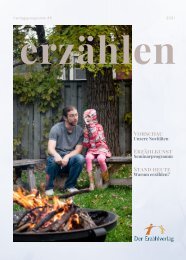Leseprobe: Das Rad der Trauer in Bewegung von Dorothea Stockmar
Was haben Anker, Kuh und Kompass mit Trauer zu tun? Eine spannende Frage. Trauer ist die Antwort unserer Seele auf einen tief empfundenen Verlust. Trauer schmerzt, und doch ist es wichtig, dass sie wahrgenommen und durchlebt wird, damit die Seele den Verlust bewältigen und eine neue Balance finden kann. Die in unserer Neuerscheinung der Künstlerin und Autorin Dorothea Stockmar beschriebene Symbolik vermittelt eine Ahnung von den unzähligen Gefühlsschattierungen der Trauer.
Was haben Anker, Kuh und Kompass mit Trauer zu tun? Eine spannende Frage. Trauer ist die Antwort unserer Seele auf einen tief empfundenen Verlust. Trauer schmerzt, und doch ist es wichtig, dass sie wahrgenommen und durchlebt wird, damit die Seele den Verlust bewältigen und eine neue Balance finden kann. Die in unserer Neuerscheinung der Künstlerin und Autorin Dorothea Stockmar beschriebene Symbolik vermittelt eine Ahnung von den unzähligen Gefühlsschattierungen der Trauer.
Sie wollen auch ein ePaper? Erhöhen Sie die Reichweite Ihrer Titel.
YUMPU macht aus Druck-PDFs automatisch weboptimierte ePaper, die Google liebt.
There is more to life<br />
than <strong>in</strong>creas<strong>in</strong>g its speed.<br />
Mahatma Gandhi
INHALT<br />
CONTENT<br />
VORWORT<br />
Dr. phil. Kerst<strong>in</strong> Volland .............6<br />
EINFÜHRUNG ............................. 8<br />
<strong>Trauer</strong> – e<strong>in</strong> tiefes Gefühl ................8<br />
SYMBOLE DER TRAUER ............. 9<br />
WAHRNEHMEN<br />
UND VERSTEHEN ...................... 14<br />
<strong>Trauer</strong> wird sichtbar ..................... 14<br />
Den Verlust begreifen ................... 15<br />
Im Haus <strong>der</strong> <strong>Trauer</strong> ....................... 16<br />
<strong>Trauer</strong> – e<strong>in</strong>e Reise<br />
<strong>in</strong>s Ungewisse .............................. 18<br />
E<strong>in</strong> <strong>Trauer</strong>koffer ............................ 19<br />
AUS TRAUERSYMBOLEN<br />
WERDEN<br />
HOFFNUNGSSYMBOLE ............. 21<br />
DAS RAD DER TRAUER ............. 25<br />
PREFACE<br />
Dr. phil. Kerst<strong>in</strong> Volland .............6<br />
INTRODUCTION ......................... 8<br />
Grief – a deep Feel<strong>in</strong>g ..................... 8<br />
SYMBOLS OF GRIEF.................... 9<br />
PERCEIVING<br />
AND UNDERSTANDING ............ 14<br />
Grief becomes visible ................... 14<br />
Un<strong>der</strong>stand<strong>in</strong>g the loss ................ 15<br />
In the House of Mourn<strong>in</strong>g ........... 16<br />
Mourn<strong>in</strong>g – a Journey <strong>in</strong>to<br />
the Unknown .............................. 18<br />
A Mourn<strong>in</strong>g Suitcase ................... 19<br />
SYMBOLS OF GRIEF<br />
BECOME SYMBOLS<br />
OF HOPE ..................................... 21<br />
THE WHEEL OF MOURNING ... 25<br />
4
INHALT | CONTENT<br />
TRAUER VERWANDELT ........... 28<br />
<strong>Das</strong> Kleid <strong>der</strong> <strong>Trauer</strong> .................... 29<br />
Gestaltung e<strong>in</strong>es <strong>Trauer</strong>kleides ... 30<br />
Im Garten <strong>der</strong> <strong>Trauer</strong> .................... 32<br />
Auf dem Weg zum Haus<br />
<strong>der</strong> <strong>Trauer</strong> ..................................... 33<br />
<strong>Trauer</strong>n und Malen ....................... 37<br />
BOTSCHAFT DER TRAUER ...... 39<br />
JENSEITS VON ALLEM<br />
Trialog mit Bil<strong>der</strong>n<br />
<strong>von</strong> Jochen P. Heite ................. 40<br />
GLOSSAR ..................................... 74<br />
EPILOG<br />
Dr. Margaret Brearley ............... 76<br />
DANKSAGUNG ........................... 78<br />
ÜBER DIE KÜNSTER*INNEN ... 80<br />
IMPRESSUM .............................. 82<br />
MOURNING TRANSFORMED... 28<br />
The Dress of Mourn<strong>in</strong>g ................ 29<br />
Design of a Mourn<strong>in</strong>g Dress ........ 30<br />
In the Garden of Mourn<strong>in</strong>g ......... 32<br />
On the Way to the House<br />
of Mourn<strong>in</strong>g ................................. 33<br />
Mourn<strong>in</strong>g and Pa<strong>in</strong>t<strong>in</strong>g ................ 37<br />
MESSAGE OF MOURNING ........ 39<br />
BEYOND ALL<br />
Trialogue with Images<br />
by Jochen P. Heite .................... 40<br />
GLOSSERY .................................. 74<br />
EPILOGUE<br />
Dr. Margaret Brearley ............... 76<br />
ACKNOWLAGEMENT ............... 78<br />
ABOUT THE ARTISTS .............. 80<br />
IMPRINT .................................... 82<br />
5
VORWORT<br />
PREFACE<br />
Was haben Anker, Kuh und Kompass<br />
mit <strong>Trauer</strong> zu tun? E<strong>in</strong>e spannende<br />
Frage.<br />
<strong>Trauer</strong> ist die Antwort unserer<br />
Seele auf e<strong>in</strong>en tief empfundenen<br />
Verlust. <strong>Trauer</strong> schmerzt, und doch<br />
ist es wichtig, dass sie wahrgenommen<br />
und durchlebt wird, damit die<br />
Seele den Verlust bewältigen und<br />
e<strong>in</strong>e neue Balance f<strong>in</strong>den kann.<br />
Wenn <strong>Trauer</strong> verdrängt wird, wenn<br />
sie heruntergeschluckt und nicht<br />
zum Ausdruck gebracht wird, kann<br />
sie verste<strong>in</strong>ern und e<strong>in</strong>en Menschen<br />
verhärten. <strong>Trauer</strong> braucht e<strong>in</strong>en<br />
Ausdruck – e<strong>in</strong>e Form –, damit wir<br />
sie be- und verarbeiten können.<br />
Aber was tun, wenn die <strong>Trauer</strong><br />
den Verstand übersteigt und die<br />
Begriffe sprengt? Wie <strong>von</strong> Erschütterung<br />
und Verzweiflung erzählen,<br />
wenn die <strong>Trauer</strong> sprachlos macht?<br />
Die <strong>in</strong> Celle lebende <strong>Trauer</strong>begleiter<strong>in</strong><br />
<strong>Dorothea</strong> <strong>Stockmar</strong> begegnet<br />
<strong>der</strong> <strong>Trauer</strong> auf <strong>der</strong> Ebene des<br />
Erlebens und Fühlens. Dort f<strong>in</strong>det<br />
sie kreative, gestalterische Möglichkeiten,<br />
die <strong>der</strong> <strong>Trauer</strong> e<strong>in</strong>e <strong>in</strong>dividuelle<br />
Form geben und dazu beitragen,<br />
sich mit ihr ause<strong>in</strong>an<strong>der</strong>zusetzen.<br />
So können, wenn die Worte fehlen,<br />
What do anchor, cow and compass<br />
have to do with mourn<strong>in</strong>g? An excit<strong>in</strong>g<br />
question.<br />
Grief is our soul’s response to a<br />
deeply felt loss. Grief hurts, and yet<br />
it is important that it is acknowledged<br />
and lived through so that the<br />
soul can cope with the loss and f<strong>in</strong>d<br />
a new balance.<br />
If grief is repressed, if it is swallowed<br />
and not expressed, it can petrify<br />
and harden a person.<br />
Grief needs an expression – a<br />
form – so that we can process and<br />
overcome it.<br />
But what do we do when grief<br />
exceeds our un<strong>der</strong>stand<strong>in</strong>g and goes<br />
beyond our concepts? How to tell of<br />
shock and despair when grief ren<strong>der</strong>s<br />
us speechless?<br />
<strong>Dorothea</strong> <strong>Stockmar</strong>, a grief counsellor<br />
liv<strong>in</strong>g <strong>in</strong> Celle, meets grief on<br />
the level of experienc<strong>in</strong>g and feel<strong>in</strong>g.<br />
There she f<strong>in</strong>ds creative, creative<br />
possibilities that give grief an <strong>in</strong>dividual<br />
form and help to deal with it.<br />
Symbols can help when words are<br />
lack<strong>in</strong>g. They are able to capture the<br />
grief experience, which varies from<br />
person to person and is often not<br />
captured by words. The symbolism<br />
6
VORWORT | PREFACE<br />
Symbole helfen. Sie vermögen das<br />
<strong>von</strong> Mensch zu Mensch ganz unterschiedliche<br />
<strong>Trauer</strong>erleben e<strong>in</strong>zufangen,<br />
das durch Begriffe häufig nicht<br />
erfasst wird. Die im Buch beschriebene<br />
Symbolik vermittelt e<strong>in</strong>e Ahnung<br />
<strong>von</strong> den unzähligen Gefühlsschattierungen<br />
<strong>der</strong> <strong>Trauer</strong>.<br />
Ob Anker, Kuh o<strong>der</strong> Kompass – irgendetwas<br />
aus dem alltäglichen Leben<br />
kann plötzlich bedeutsam werden,<br />
da es das persönliche Bef<strong>in</strong>den<br />
genau wi<strong>der</strong>spiegelt. Symbole können<br />
die <strong>Trauer</strong> greifbar machen, sie stiften<br />
Halt, können den Weg durch die <strong>Trauer</strong><br />
weisen und Hoffnung vermitteln.<br />
Neben den Symbolen gibt es weitere<br />
Alternativen, <strong>der</strong> <strong>Trauer</strong> Ausdruck<br />
zu verleihen. Sie kann <strong>in</strong> Ritualen<br />
Raum f<strong>in</strong>den o<strong>der</strong> <strong>in</strong> Bil<strong>der</strong>n<br />
und Dichtungen (Sprachbil<strong>der</strong>n),<br />
man kann ihr e<strong>in</strong> Haus malen, e<strong>in</strong>en<br />
Garten anlegen o<strong>der</strong> sie <strong>in</strong> e<strong>in</strong> Gewand<br />
kleiden.<br />
All dies s<strong>in</strong>d Möglichkeiten, <strong>der</strong><br />
<strong>Trauer</strong> e<strong>in</strong>e Form zu geben, um mit<br />
ihr umgehen zu können – und all<br />
diesen Möglichkeiten wohnt Tatkraft<br />
<strong>in</strong>ne. Sie setzen dem Gefühl,<br />
<strong>der</strong> <strong>Trauer</strong> ohnmächtig ausgeliefert<br />
zu se<strong>in</strong>, die Chance ihrer aktiven<br />
Gestaltung entgegen. Sie betonen<br />
und stärken die Handlungsfähigkeit<br />
trauern<strong>der</strong> Menschen. Damit wird<br />
<strong>der</strong> verbreitete Begriff <strong>der</strong> <strong>Trauer</strong>arbeit<br />
<strong>in</strong> se<strong>in</strong>em buchstäblichen und<br />
kreativsten S<strong>in</strong>ne e<strong>in</strong>gelöst.<br />
described <strong>in</strong> the book conveys an<br />
idea of the <strong>in</strong>numerable shades of<br />
mourn<strong>in</strong>g.<br />
Whether it is an anchor, a cow or<br />
a compass – someth<strong>in</strong>g from everyday<br />
life can suddenly become significant<br />
as it accurately reflects the<br />
personal state of m<strong>in</strong>d.<br />
Symbols can make grief tangible,<br />
they provide support, can show the<br />
way through grief and convey hope.<br />
In addition to symbols, there are<br />
other alternatives for express<strong>in</strong>g<br />
grief. It can f<strong>in</strong>d space <strong>in</strong> rituals or <strong>in</strong><br />
pictures and poetry (language images),<br />
one can pa<strong>in</strong>t a house for it, plant<br />
a garden or dress it <strong>in</strong> a garment.<br />
All these are ways of giv<strong>in</strong>g grief<br />
a form <strong>in</strong> or<strong>der</strong> to be able to deal<br />
with it – and all these possibilities<br />
have an <strong>in</strong>herent energy. They counteract<br />
the feel<strong>in</strong>g of be<strong>in</strong>g powerless<br />
over grief with the opportunity to<br />
actively shape it. They emphasise<br />
and strengthen the ability of griev<strong>in</strong>g<br />
people to act. In this way, the<br />
widespread concept of grief work is<br />
redeemed <strong>in</strong> its most literal and creative<br />
sense.<br />
Dr. phil. Kerst<strong>in</strong> Volland<br />
Koord<strong>in</strong>ator<strong>in</strong> | Coord<strong>in</strong>ator<br />
Hospizbewegung Herford e. V.<br />
7
EINFÜHRUNG<br />
INTRODUCTION<br />
TRAUER – EIN TIEFES GEFÜHL<br />
Neben <strong>der</strong> Liebe ist <strong>Trauer</strong> das am<br />
tiefsten empfundene Gefühl, das wir<br />
zum Ausdruck br<strong>in</strong>gen können.<br />
Die <strong>Trauer</strong> durchdr<strong>in</strong>gt das tägliche<br />
Leben. Sie ist nicht nur präsent,<br />
wenn e<strong>in</strong> Mensch gestorben ist.<br />
<strong>Trauer</strong> begleitet uns immer dann,<br />
wenn wir e<strong>in</strong>en großen persönlichen<br />
Verlust betroffen s<strong>in</strong>d.<br />
• K<strong>in</strong><strong>der</strong>, die nicht mit Liebe erzogen<br />
worden s<strong>in</strong>d, trauern!<br />
• Jugendliche, <strong>der</strong>en Träume sich<br />
nicht erfüllt haben, trauern!<br />
• Menschen, die ihren Arbeitsplatz<br />
verloren haben o<strong>der</strong> gezwungen<br />
s<strong>in</strong>d, <strong>in</strong> den Ruhestand zu gehen,<br />
trauern!<br />
• Schwerkranke Menschen, die auf<br />
Medikamente und ständige Hilfe<br />
angewiesen s<strong>in</strong>d, trauern!<br />
• Männer und Frauen, die sich für<br />
e<strong>in</strong>e Trennung entschieden haben,<br />
nachdem sie Zeiten <strong>der</strong> Verzweiflung<br />
und vielleicht sogar <strong>der</strong> Demütigung<br />
durchlebt haben, trauern!<br />
• Menschen, die ihr Lebensziel, ihre<br />
Pläne für die Zukunft verloren ha-<br />
GRIEF – A DEEP FEELING<br />
Next to love, grief is the most deeply<br />
felt emotion we can express.<br />
Grief permeates daily life. It is<br />
not only present when a person has<br />
died. Grief accompanies us whenever<br />
we are affected by a great personal<br />
loss.<br />
• Children who have not been raised<br />
with love, mourn!<br />
• Youngsters whose dreams have not<br />
come true mourn!<br />
• People who have lost their jobs or<br />
are forced to retire, mourn!<br />
• Seriously ill people who are dependent<br />
on medication and constant<br />
help, mourn!!<br />
• Men and women who have decided<br />
to separate, after hav<strong>in</strong>g gone<br />
through times of despair and perhaps<br />
even humiliation, mourn!<br />
• People who have lost their goal <strong>in</strong><br />
life, their plans for the future or<br />
who have to give up their home for<br />
whatever reason, mourn!<br />
• Dy<strong>in</strong>g people and their relatives,<br />
who are confronted with death <strong>in</strong><br />
8
en o<strong>der</strong> die ihre Heimat, aus welchen<br />
Gründen auch immer, aufgeben<br />
müssen, trauern!<br />
• Sterbende und Angehörige, die angesichts<br />
des geistigen und körperlichen<br />
Verfalls mit dem Tod konfrontiert<br />
werden, trauern lange vor<br />
dem E<strong>in</strong>tritt des Todes!<br />
the face of mental and physical<br />
deterioration grieve long before<br />
death occurs!<br />
SYMBOLE DER TRAUER<br />
SYMBOLS OF GRIEF<br />
Die unmittelbare Erschütterung <strong>in</strong><br />
<strong>der</strong> <strong>Trauer</strong> kann an Hand <strong>von</strong> Symbolen<br />
verdeutlicht werden. Bildhafte<br />
Beschreibungen können helfen, das<br />
Unaussprechliche zu erfassen.<br />
Faden<br />
H<strong>in</strong>terbliebene fühlen sich <strong>von</strong> ihrem<br />
früheren Leben getrennt wie<br />
<strong>von</strong> e<strong>in</strong>em durchtrennten Faden.<br />
Nichts ist mehr so, wie es e<strong>in</strong>mal<br />
war.<br />
Kompassnadel<br />
Alles sche<strong>in</strong>t ver-rückt. Ohne Ziel<br />
und Zweck. <strong>Trauer</strong>nde Menschen<br />
wissen oft nicht, woh<strong>in</strong> sie gehen<br />
sollen. Selbst e<strong>in</strong>e Kompassnadel ist<br />
nicht <strong>in</strong> <strong>der</strong> Lage, den Weg aus <strong>der</strong><br />
<strong>Trauer</strong> zu weisen.<br />
The immediate shock of grief can be<br />
visualised us<strong>in</strong>g symbols. Pictorial<br />
descriptions can help to grasp the<br />
<strong>in</strong>expressible.<br />
Thread<br />
Bereaved people feel separated from<br />
their former lives like a cut thread.<br />
Noth<strong>in</strong>g is as it once has been.<br />
Compass Needle<br />
Everyth<strong>in</strong>g seems displaced and <strong>in</strong>sane.<br />
Griev<strong>in</strong>g people often don’t<br />
know where to go. Even a compass<br />
needle is not able to po<strong>in</strong>t the way<br />
out of grief.<br />
9
JENSEITS VON ALLEM<br />
– TRIALOG<br />
BEYOND ALL<br />
– TRIALOGUE<br />
Text | Text: <strong>Dorothea</strong> <strong>Stockmar</strong><br />
Bil<strong>der</strong> | Images: Jochen P. Heite<br />
Für | For<br />
Jonathan Cajus <strong>Stockmar</strong><br />
(1991–2008)<br />
SUCHE IN DER TRAUER<br />
Je<strong>der</strong> Mensch, <strong>der</strong> e<strong>in</strong>en Verlust erlitten<br />
hat, ist e<strong>in</strong> Suchen<strong>der</strong>, <strong>der</strong> sich<br />
mehr o<strong>der</strong> weniger bewusst auf die<br />
Suche nach dem Verlorenen begibt.<br />
Ob er es will o<strong>der</strong> nicht − alles, was<br />
e<strong>in</strong> <strong>Trauer</strong>n<strong>der</strong> hört, sieht o<strong>der</strong> fühlt,<br />
kann die Er<strong>in</strong>nerung an e<strong>in</strong>en geliebten<br />
Menschen wachrufen.<br />
Die Sehnsucht nach me<strong>in</strong>em verstorbenen<br />
K<strong>in</strong>d führte mich <strong>in</strong> die<br />
entlegensten Räume me<strong>in</strong>es selbst<br />
gezimmerten <strong>Trauer</strong>hauses. „Da wo<br />
<strong>der</strong> Schmerz ist, geht’s lang“, hörte<br />
ich mich immer wie<strong>der</strong> sagen.<br />
SEARCHING IN GRIEF<br />
Every person who has suffered a loss<br />
is <strong>in</strong> search of what has been lost,<br />
more or less consciously. Whether<br />
he wants it or not − everyth<strong>in</strong>g<br />
a mourner hears, sees or feels can<br />
evoke the memory of a loved one.<br />
The long<strong>in</strong>g for my deceased child<br />
took me to the most remote rooms<br />
of my self-made house of mourn<strong>in</strong>g.<br />
“Where the pa<strong>in</strong> is, that’s where it’s<br />
go<strong>in</strong>g,” I kept tell<strong>in</strong>g myself.<br />
40
BEYOND ALL<br />
Denn <strong>Trauer</strong> ist die Suche nach<br />
e<strong>in</strong>er verlorenen Zeit. E<strong>in</strong>e Suche,<br />
die nicht aufhört, die im Hier und<br />
Jetzt erlebt werden will, <strong>in</strong> Gesten,<br />
Gedanken o<strong>der</strong> Worten. Wo immer<br />
Er<strong>in</strong>nerungen an me<strong>in</strong>en verstorbenen<br />
Sohn wachgerufen wurden,<br />
folgte ich ihnen.<br />
In Nächten, <strong>in</strong> denen ich kaum<br />
Schlaf fand, erfuhr ich e<strong>in</strong>e an<strong>der</strong>e<br />
Form des Bewusstse<strong>in</strong>s. Es war e<strong>in</strong><br />
klares, tiefes E<strong>in</strong>tauchen <strong>in</strong> e<strong>in</strong>en<br />
Zustand jenseits <strong>von</strong> Zeit und Raum,<br />
welcher ke<strong>in</strong> Traum war.<br />
immer − und nie wie<strong>der</strong> −<br />
sehe ich dich<br />
<strong>in</strong> Zeichen, <strong>in</strong> Bil<strong>der</strong>n<br />
<strong>in</strong> Gesten − überall<br />
Weltseele: Es war e<strong>in</strong> langer, trockener<br />
Sommer. Regentropfen begannen,<br />
die ausgedörrte Erde aufzuweichen.<br />
E<strong>in</strong> Tropfen fiel auf e<strong>in</strong> Blatt.<br />
E<strong>in</strong> Blatt wie e<strong>in</strong> Leben, das eben<br />
noch am Kirschbaum h<strong>in</strong>g. – Gestern<br />
noch voller Leben, heute schon Teil<br />
<strong>der</strong> Erde.<br />
Dabei waren wir alle schon immer<br />
Teil e<strong>in</strong>es umfassenden <strong>Das</strong>e<strong>in</strong>s,<br />
ob im Mutterschoß o<strong>der</strong> als Blatt e<strong>in</strong>es<br />
weit verzweigten Baumes.<br />
Keimblatt des Entstehens<br />
und Vergehens<br />
Durchbruch – Übergang – Pforte<br />
am Ende e<strong>in</strong>es hellen Tunnels<br />
For grief is the search for a lost<br />
time. A search that does not stop,<br />
that wants to be experienced <strong>in</strong> the<br />
Here and Now, <strong>in</strong> gestures, thoughts<br />
or words. Wherever memories of my<br />
deceased son were evoked, I followed<br />
them.<br />
On nights when I could hardly<br />
f<strong>in</strong>d sleep, I experienced another<br />
form of consciousness. It was a clear,<br />
deep immersion <strong>in</strong>to a state beyond<br />
time and space, which was not a<br />
dream.<br />
always − and never aga<strong>in</strong> −<br />
I see you<br />
<strong>in</strong> signs, <strong>in</strong> pictures<br />
<strong>in</strong> gestures − everywhere<br />
Weltseele: It was a long, dry summer.<br />
Ra<strong>in</strong>drops began to soften the<br />
parched earth. A drop fell on a leaf.<br />
A leaf like a life that had just been<br />
hang<strong>in</strong>g from the cherry tree. – Yesterday<br />
still full of life, today already<br />
part of the earth.<br />
Yet we all have been always<br />
part of a comprehensive existence,<br />
whether <strong>in</strong> the womb or as a leaf on<br />
a widely branch<strong>in</strong>g tree.<br />
seed leaf aris<strong>in</strong>g<br />
and vanish<strong>in</strong>g<br />
breakthrough – transition – portal<br />
at the end of a bright tunnel<br />
41
JENSEITS VON ALLEM<br />
Mutter: Welch seltsame Worte? Was<br />
für e<strong>in</strong> Tunnel, was für e<strong>in</strong> Durchbruch?<br />
Am Ende gibt es doch e<strong>in</strong>en<br />
Weg zu me<strong>in</strong>em verstorbenen K<strong>in</strong>d?<br />
Sohn: Ja, hier b<strong>in</strong> ich. Wir, die Toten,<br />
haben e<strong>in</strong>en Platz unter den Lebenden.<br />
Mutter: Du, me<strong>in</strong> K<strong>in</strong>d, hier? Du bist<br />
am Leben?<br />
Sohn: In e<strong>in</strong>em an<strong>der</strong>en Licht darf<br />
ich se<strong>in</strong>, was ich schon immer war<br />
– frei.<br />
Mutter: Darfst se<strong>in</strong>, was du schon<br />
immer warst, wie soll ich das begreifen?<br />
Sohn: Wie erklär ich es, damit du es<br />
verstehst? Ach was, was s<strong>in</strong>d schon<br />
Worte? Nichts! Was hier zählt, s<strong>in</strong>d<br />
Augenblicke, Gefühle, Gedanken, die<br />
unausgesprochen zu Herzen gehen,<br />
ohne dass jemand etwas sagen muss.<br />
Mutter: Gedanken, die das Herz unausgesprochen<br />
erreichen? Wie soll<br />
ich das verstehen?<br />
Sohn: Nun, es gibt hier ke<strong>in</strong>e Zeit<br />
und ke<strong>in</strong> Festhalten an Gedanken<br />
und an Gefühlen. Alles ist und war<br />
schon immer da – ohne Anfang –<br />
ohne Ende.<br />
Mother: Which strange words?<br />
What a tunnel? What a breakthrough?<br />
In the end there is a way to<br />
my deceased child after all?<br />
Son: Yes, here I am. We, the dead,<br />
have a place among the liv<strong>in</strong>gs.<br />
Mother: You, my child, here? You are<br />
alive?<br />
Son: In another light I could be what<br />
I have been always – free.<br />
Mother: You can be what you have<br />
always been, how can I un<strong>der</strong>stand<br />
that?<br />
Son: How do I expla<strong>in</strong> it so you’ll un<strong>der</strong>stand?<br />
Oh, what are words? Noth<strong>in</strong>g!<br />
What counts here are moments,<br />
feel<strong>in</strong>gs, thoughts that go unspoken<br />
to the heart without anyone hav<strong>in</strong>g<br />
to say anyth<strong>in</strong>g.<br />
Mother: Thoughts that reach the<br />
heart unspoken? How shall I un<strong>der</strong>stand<br />
this?<br />
Son: Well, there is no time here and<br />
no cl<strong>in</strong>g<strong>in</strong>g to thoughts and feel<strong>in</strong>gs.<br />
Everyth<strong>in</strong>g is and has always been<br />
there – without a beg<strong>in</strong>n<strong>in</strong>g – without<br />
an end<strong>in</strong>g.<br />
42
BEYOND ALL<br />
43
JENSEITS VON ALLEM<br />
Mutter: <strong>Das</strong> geht mir zu weit! Aber<br />
du warst mir ja schon immer e<strong>in</strong>e<br />
Nasenlänge voraus. In allem so<br />
schnell, dass ich oft nicht h<strong>in</strong>terherkam.<br />
Sohn: Aus me<strong>in</strong>er Sicht ist de<strong>in</strong>e E<strong>in</strong>teilung<br />
<strong>in</strong> Jahre, Tage und Stunden<br />
völliger Uns<strong>in</strong>n. Du unterteilst e<strong>in</strong><br />
Bild, das du malst, auch nicht <strong>in</strong> Zeitl<strong>in</strong>ien,<br />
die beschreiben: Den Strich da<br />
vorne habe ich um 6:30 Uhr gemalt,<br />
den <strong>in</strong> <strong>der</strong> Mitte um 6:41 Uhr und den<br />
Punkt <strong>in</strong> <strong>der</strong> oberen Ecke um sieben<br />
Uhr. Für das fertige Bild spielt das<br />
ke<strong>in</strong>e Rolle. Was zählt, ist das zeitlos<br />
Allumfassende, das Ganze.<br />
Vertraue de<strong>in</strong>e Gedanken und<br />
Gefühle <strong>der</strong> Le<strong>in</strong>wand o<strong>der</strong> e<strong>in</strong>er<br />
Seite <strong>in</strong> de<strong>in</strong>em Tagebuch an. Tu das,<br />
was dir hilft, den Schmerz aus de<strong>in</strong>em<br />
Kopf zu bekommen! Ich b<strong>in</strong> bei<br />
dir, was immer du tust.<br />
Mutter: Wie kann ich sicher se<strong>in</strong>,<br />
dass du es wirklich bist? Es ist nicht<br />
de<strong>in</strong> Äußeres, <strong>in</strong> dem ich dich erkenne.<br />
Du siehst so an<strong>der</strong>s aus! Vielmehr<br />
ist es de<strong>in</strong> Wesen. De<strong>in</strong>e jugendliche<br />
Neugier. Die Art und Weise, wie du<br />
die D<strong>in</strong>ge angehst. Unbeschwert und<br />
doch so voller Tiefe. Ja, dar<strong>in</strong> erkenne<br />
ich dich wie<strong>der</strong>.<br />
Mother: That’s go<strong>in</strong>g too far for me!<br />
But you’ve always been one step<br />
ahead of me. So fast <strong>in</strong> everyth<strong>in</strong>g<br />
that I often couldn’t keep up with<br />
you.<br />
Son: From my po<strong>in</strong>t of view your division<br />
<strong>in</strong>to years, days and hours is<br />
complete nonsense. You also don’t<br />
divide a picture you pa<strong>in</strong>t <strong>in</strong>to time<br />
l<strong>in</strong>es that describe: I pa<strong>in</strong>ted the<br />
l<strong>in</strong>e <strong>in</strong> front at 6:30, the one <strong>in</strong> the<br />
middle at 6:41 and that po<strong>in</strong>t <strong>in</strong> the<br />
upper corner at seven o’clock. That<br />
doesn’t matter for the f<strong>in</strong>ished picture.<br />
What counts is the timeless<br />
all-embrac<strong>in</strong>g, the whole.<br />
Confide your thoughts and feel<strong>in</strong>gs<br />
to the canvas or a page <strong>in</strong> your<br />
diary. Do what helps you to get the<br />
pa<strong>in</strong> out of your head! I am with you,<br />
whatever you do.<br />
Mother: How can I be sure it’s really<br />
you? It’s not your appearance that I<br />
recognize you <strong>in</strong>. You look so different!<br />
Rather, it’s your nature. Your<br />
youthful curiosity. The way you approach<br />
th<strong>in</strong>gs. Light-hearted and yet<br />
so full of depth. Yes, I recognize you<br />
<strong>in</strong> that.<br />
44
BEYOND ALL<br />
Sohn: Wie oft hast du nach dem<br />
S<strong>in</strong>n des Lebens gefragt. Fragen gestellt<br />
wie: „Was ist <strong>der</strong> Tod? Gibt es<br />
e<strong>in</strong> Leben danach?“<br />
Mutter: Jetzt bist du es, <strong>der</strong> auf e<strong>in</strong><br />
Leben nach dem Tod verweist. Aber<br />
sag mir, auf welchem Kanal kann ich<br />
dich erreichen?<br />
Weltseele: Wäret ihr Menschen<br />
doch nur bereit, e<strong>in</strong>e an<strong>der</strong>e Wellenlänge<br />
zu wählen, ihr könntet ganz<br />
an<strong>der</strong>e Botschaften empfangen.<br />
Doch ihr fühlt euch h<strong>in</strong>e<strong>in</strong>geworfen<br />
<strong>in</strong> e<strong>in</strong>e Welt <strong>der</strong> nackten Tatsachen,<br />
Maßzahlen, Normen und <strong>der</strong> Aufgabe,<br />
wählen zu müssen.<br />
Mutter: Apropos Wahl, hatte me<strong>in</strong><br />
Sohn überhaupt e<strong>in</strong>e? Ich weiß es<br />
nicht. Aber e<strong>in</strong>es weiß ich, se<strong>in</strong> Tod<br />
kam zu plötzlich!<br />
Son: How often did you ask about<br />
the mean<strong>in</strong>g of life? Asked questions<br />
like, “What is death? Is there a life<br />
after?“<br />
Mother: Now it is you who refers to<br />
life after death. But tell me, on what<br />
channel can I reach you?<br />
Weltseele: If only you humans were<br />
will<strong>in</strong>g to choose a different wavelength,<br />
you could receive very different<br />
messages. But you feel thrown<br />
<strong>in</strong>to a world of bare facts, measurements,<br />
standards and the task of<br />
hav<strong>in</strong>g to choose.<br />
Mother: Speak<strong>in</strong>g of choice, did my<br />
son have any? I don’t know. But one<br />
th<strong>in</strong>g I do know for sure, his death<br />
came too suddenly!<br />
45
JENSEITS VON ALLEM<br />
Weltseele: Was soll das heißen, es<br />
war zu plötzlich? Für euch, die Lebenden,<br />
kommt <strong>der</strong> Tod immer zu<br />
früh. Ihr verschließt die Augen vor<br />
<strong>der</strong> Tatsache eures eigenen Vergehens.<br />
Wie e<strong>in</strong> K<strong>in</strong>d, das sich die Augen<br />
zuhält und vorgibt, nicht gesehen<br />
zu werden.<br />
Aber ich sage euch, ihr könnt den<br />
Tod nicht ausklammern. Lerne auch<br />
du zu verstehen, dass de<strong>in</strong> Sohn dem<br />
Tod nicht entkommen konnte. Der<br />
Tod war − bevor er überhaupt geboren<br />
wurde − Teil se<strong>in</strong>es Lebens.<br />
Mutter: Aber warum musste er so<br />
früh sterben?<br />
Weltseele: Frage nicht nach dem<br />
Warum. Frage nach dem Wozu! Nach<br />
e<strong>in</strong>er neuen Deutung. De<strong>in</strong> Sohn ist<br />
nie fort gewesen. Bevor er auf diese<br />
Welt kam, war er bereits <strong>in</strong> de<strong>in</strong>em<br />
Herzen. Und genau so ist er jetzt<br />
noch bei dir. Auch wenn du ihn nicht<br />
sehen kannst, ist er doch da.<br />
Es gibt D<strong>in</strong>ge, die du noch nicht<br />
erkennen kannst. Aber es ist ke<strong>in</strong>e<br />
Frage des Sehens o<strong>der</strong> Scharfstellens.<br />
Es ist e<strong>in</strong>e Frage des Herzens.<br />
Mit de<strong>in</strong>em Herzen wirst du fühlen<br />
und verstehen.<br />
Wie war es vor <strong>der</strong> Geburt, als du<br />
de<strong>in</strong>en Sohn zum ersten Mal spürtest?<br />
Er<strong>in</strong>nerst du dich daran, wie es<br />
war?<br />
Weltseele: What do you mean, it<br />
was too sudden? For you, the liv<strong>in</strong>g,<br />
death is always too early. You keep<br />
your eyes closed to the fact of your<br />
own pass<strong>in</strong>g. Like a child who covers<br />
his eye, pretend<strong>in</strong>g not to be seen.<br />
But I tell you, you cannot prevent<br />
death. Learn to un<strong>der</strong>stand, too, that<br />
your son could not escape death.<br />
Death was − before he was even born<br />
− part of his life.<br />
Mother: But why did he have to die<br />
so early?<br />
Weltseele: Don’t ask why. Ask for the<br />
what for! For a new mean<strong>in</strong>g. Your<br />
son has never been away. Before he<br />
came <strong>in</strong>to this world, he was already<br />
<strong>in</strong> your heart. And <strong>in</strong> the same way<br />
he is still with you now. Even if you<br />
cannot see him, he is still there.<br />
There are th<strong>in</strong>gs you can’t recognise<br />
yet. But it is not a question of<br />
see<strong>in</strong>g or focus<strong>in</strong>g. It is a matter of<br />
the heart. With your heart you will<br />
feel and un<strong>der</strong>stand.<br />
How was it, before birth, when<br />
you felt your son for the first time?<br />
Do you remember what it was like?<br />
46
BEYOND ALL<br />
47
JENSEITS VON ALLEM<br />
Mutter: In me<strong>in</strong>em Herzen fühlte<br />
ich se<strong>in</strong> Kommen schon recht früh,<br />
noch bevor er <strong>in</strong> mir Gestalt annahm.<br />
In ersten zarten <strong>Bewegung</strong>en<br />
unter me<strong>in</strong>em Herzen, die immer<br />
heftiger wurden, mit <strong>der</strong> Gewissheit<br />
se<strong>in</strong>es Werdens außerhalb me<strong>in</strong>er<br />
Selbst.<br />
E<strong>in</strong> Wun<strong>der</strong>, ja, doch gezeugt und<br />
schon erkannt <strong>in</strong> e<strong>in</strong>er an<strong>der</strong>en, e<strong>in</strong>er<br />
vorbewussten Welt. E<strong>in</strong>er Welt,<br />
aus <strong>der</strong> wir alle kommen.<br />
Mehr denn je, quälen mich seit<br />
se<strong>in</strong>em Fortgang Fragen, die ich mir<br />
immer wie<strong>der</strong> stelle:<br />
Wer s<strong>in</strong>d wir? Woher kommen<br />
wir? Woh<strong>in</strong> gehen wir?<br />
Weltseele: Jetzt ist <strong>der</strong> Augenblick<br />
des Erkennens gekommen, so als<br />
würdest du Schale um Schale abwerfen,<br />
bis <strong>der</strong> Kern de<strong>in</strong>es wahren Wesens<br />
zum Vorsche<strong>in</strong> kommt.<br />
vorgeburtlich angelegtes Se<strong>in</strong><br />
verlebendigt <strong>in</strong> e<strong>in</strong>er Welt<br />
des steten Wandels<br />
am Ende e<strong>in</strong>es großen Schauspiels<br />
Ihr nennt es Leben<br />
Sohn: Es kann se<strong>in</strong>, dass du mich<br />
heute <strong>von</strong> e<strong>in</strong>er an<strong>der</strong>en Seite kennen<br />
lernst, denn ich b<strong>in</strong> nicht <strong>der</strong>,<br />
<strong>der</strong> ich e<strong>in</strong>mal war. Ich b<strong>in</strong> jetzt Teil<br />
<strong>der</strong> – Weltseele –.<br />
Ja, es gibt sie, die Weltseele, die<br />
alles e<strong>in</strong>t und b<strong>in</strong>det.<br />
Mother: In my heart I felt his com<strong>in</strong>g<br />
quite early, even before he took<br />
shape <strong>in</strong> me. In first ten<strong>der</strong> movements<br />
un<strong>der</strong> my heart, which became<br />
more and more violent, with<br />
the certa<strong>in</strong>ty of his existence outside<br />
of myself.<br />
A miracle, yes, yet conceived and<br />
already recognized <strong>in</strong> another, a preconscious<br />
world. A world from which<br />
we all come.<br />
More than ever, s<strong>in</strong>ce his departure,<br />
I am tormented by questions<br />
that I keep ask<strong>in</strong>g myself:<br />
Who are we? Where do we come<br />
from? Where are we go<strong>in</strong>g to?<br />
Weltseele: Now the moment of recognition<br />
has come, as if you were<br />
shedd<strong>in</strong>g shell after shell until the<br />
core of your true be<strong>in</strong>g emerges.<br />
preborn existence<br />
brought to life <strong>in</strong> a world<br />
of constant change<br />
at the end of a great spectacle<br />
you call it life<br />
Son: Today you will get to know a<br />
completely different side of me, for I<br />
am no longer who I once was. I am<br />
now a part of the – Weltseele –.<br />
Yes, it really exists: the World<br />
Soul that unites and connects<br />
everyth<strong>in</strong>g.<br />
48
BEYOND ALL<br />
49
JENSEITS VON ALLEM<br />
Du wusstest nicht, dass alles e<strong>in</strong>s<br />
ist? Es geht nicht um mich o<strong>der</strong> dich<br />
– es geht um das Verbundene, das<br />
Ganze.<br />
Mutter: Wie soll ich das denn verstehen?<br />
Sohn: Frag die Weltseele, die weiß es.<br />
Weltseele: Ihr seid wie die Tropfen<br />
im Meer, alle mite<strong>in</strong>an<strong>der</strong> verbunden.<br />
All-E<strong>in</strong>s im Ozean <strong>der</strong> unbegrenzten<br />
Möglichkeiten. E<strong>in</strong>e Unterscheidung<br />
zwischen Körper, Geist<br />
und Seele, gibt es nicht, sobald du die<br />
Pforte <strong>der</strong> Erkenntnis erreicht hast.<br />
Mutter: Welche Pforte, welche Erkenntnis?<br />
Soll das heißen, dass das<br />
viele Denken und Grübeln nach dem<br />
Tod ke<strong>in</strong> Ende nimmt? Hatte gehofft,<br />
dass es dort ruhiger zugeht. Sprachst<br />
du nicht immer wie<strong>der</strong> <strong>von</strong> ewiger<br />
Ruhe, ewigem Licht?<br />
Sohn: Ja, alles, was hier geschieht,<br />
entspr<strong>in</strong>gt e<strong>in</strong>em lichtvollen Se<strong>in</strong>,<br />
ohne Anfang, ohne Ende. Deshalb<br />
ist es auch nicht nötig für mich zur<br />
Ruhe zu kommen. Ruhe und <strong>Bewegung</strong><br />
s<strong>in</strong>d e<strong>in</strong> und <strong>Das</strong>selbe.<br />
Wie <strong>in</strong> e<strong>in</strong>em Meer, das <strong>von</strong> unzähligen<br />
Wellen getragen wird,<br />
taucht man e<strong>in</strong>, nur um im selben<br />
Moment wie<strong>der</strong> aufzutauchen.<br />
You didn’t know that everyth<strong>in</strong>g<br />
is one? It is not about me or you – it is<br />
all about the connection, he whole.<br />
Mother: How am I supposed to un<strong>der</strong>stand?<br />
Son: Ask the Weltseele who knows<br />
it.<br />
Weltseele: You are like the drops<br />
<strong>in</strong> the ocean, all connected; all-one<br />
<strong>in</strong> the ocean of unlimited possibilities.<br />
There is no dist<strong>in</strong>ction between<br />
body, m<strong>in</strong>d and soul, once you have<br />
reached the portal of knowledge.<br />
Mother: Which portal, which<br />
knowledge? Do you mean that there<br />
is no end to all the th<strong>in</strong>k<strong>in</strong>g and<br />
brood<strong>in</strong>g after death? I had hoped<br />
that th<strong>in</strong>gs would be calmer there.<br />
Didn’t you keep talk<strong>in</strong>g about eternal<br />
rest, eternal light?<br />
Son: Yes, everyth<strong>in</strong>g that happens<br />
here arises from an essence full of<br />
light, without beg<strong>in</strong>n<strong>in</strong>g, without<br />
end. Therefore it is also not necessary<br />
for me to come to rest. Rest and<br />
movement are one and the same.<br />
Like <strong>in</strong> a sea carried by countless<br />
waves, you dive <strong>in</strong> only to emerge<br />
aga<strong>in</strong> at the same moment.<br />
50
BEYOND ALL<br />
Mutter: <strong>Das</strong> kl<strong>in</strong>gt nach Leichtigkeit,<br />
nach Erholung!<br />
Sohn: Ach was, das Wort Erholung<br />
ist mir viel zu begrenzt. Die Leichtigkeit<br />
und Erholung, die ich me<strong>in</strong>e,<br />
ist e<strong>in</strong>e an<strong>der</strong>e.<br />
Während du dich immer nur abmühst,<br />
geht hier alles viel entspannter<br />
zu. Ohne Mühe, ohne Anstrengung.<br />
Wann immer du magst, werde<br />
ich dir zur Seite stehen. Vertraue de<strong>in</strong>en<br />
E<strong>in</strong>gebungen. So s<strong>in</strong>d wir uns<br />
nah!<br />
Mutter: Damals, als ich dich empf<strong>in</strong>g,<br />
wusste ich noch nicht, dass<br />
h<strong>in</strong>ter je<strong>der</strong> Liebe e<strong>in</strong>e unauslöschliche<br />
Flamme brennt. Doch nun, da<br />
ich dir <strong>von</strong> neuem nah se<strong>in</strong> darf,<br />
wird es mir bewusst. Du hast mich<br />
gelehrt, dass die Liebe durch nichts<br />
zu ersetzen ist.<br />
Weltseele: De<strong>in</strong> Sohn hat Recht. Die<br />
Liebe ist <strong>der</strong> Nährboden allen Se<strong>in</strong>s.<br />
Geliebt zu werden bedeutet nicht<br />
nur, liebenswert zu se<strong>in</strong>, son<strong>der</strong>n<br />
auch − des Lebens würdig zu se<strong>in</strong>.<br />
In euren K<strong>in</strong><strong>der</strong>n lebt alles weiter,<br />
die Liebe und auch das Leid, verursacht<br />
durch all die vielen Kriege,<br />
die Generationen über Generationen<br />
geführt haben. Der Schmerz, die<br />
Angst vor Vergänglichkeit, vor Entbehrung<br />
und schließlich vor dem<br />
Mother: That sounds like lightness,<br />
like recreation!<br />
Son: Oh no, the word recreation is<br />
much too limited for me. The ease<br />
and relaxation I mean is another.<br />
While you’re always struggl<strong>in</strong>g,<br />
everyth<strong>in</strong>g is much more relaxed<br />
here. without effort, without stra<strong>in</strong>.<br />
Whenever you like, I will be at<br />
your side. Trust your <strong>in</strong>tuitions. That<br />
way we are close!<br />
Mother: At that time, when I received<br />
you, I did not know that beh<strong>in</strong>d<br />
every love burns an <strong>in</strong>ext<strong>in</strong>guishable<br />
flame. But now that I may<br />
be close to you anew, I realize it. You<br />
have taught me that there is no substitute<br />
for love.<br />
Weltseele: Your son is right. Love is<br />
the breed<strong>in</strong>g ground of all be<strong>in</strong>g. To<br />
be loved means, not only to be lovable,<br />
but also − to be worthy of life.<br />
In your children everyth<strong>in</strong>g lives<br />
on, love and also suffer<strong>in</strong>g, caused by<br />
the many wars which generations<br />
and generations have fought. The<br />
pa<strong>in</strong>, the fear of transience, of deprivation<br />
and f<strong>in</strong>ally of the loss of your<br />
own life − all this is deeply embedded<br />
<strong>in</strong> your souls.<br />
51
JENSEITS VON ALLEM<br />
Verlust des eigenen Lebens − all das<br />
ist tief <strong>in</strong> euren Seelen verankert.<br />
Br<strong>in</strong>gt es hervor, all das Unerlöste,<br />
Unverarbeitete. Schau es dir genau<br />
an und f<strong>in</strong>de heraus, was es dir<br />
zu sagen hat.<br />
Mutter: Soll das bedeuten, dass es<br />
me<strong>in</strong>e Aufgabe hier auf Erden ist,<br />
dieses vermaledeite Schicksal anzunehmen?<br />
Es vielleicht sogar zu lieben?<br />
Weltseele: Du hast die Chance, de<strong>in</strong><br />
Leben neu zu ordnen. Br<strong>in</strong>ge es auf<br />
den Punkt, de<strong>in</strong> Leben! Lebe jetzt,<br />
mit all de<strong>in</strong>em Schmerz; mit allen<br />
Ausrufungszeichen und Fragezeichen!<br />
Doch erwarte ke<strong>in</strong>e Antwort.<br />
Male weiter. Vielleicht malst du dir<br />
e<strong>in</strong> Haus.<br />
Mutter: Ja, <strong>Das</strong> habe ich getan. Immer<br />
wie<strong>der</strong> malte ich e<strong>in</strong> Haus. Ich<br />
nannte es das Haus me<strong>in</strong>er <strong>Trauer</strong>.<br />
Es ist e<strong>in</strong> Haus ohne Fenster, ohne<br />
Türen. Noch heute frage ich mich,<br />
wie ich dort überhaupt h<strong>in</strong>e<strong>in</strong>kommen<br />
konnte − zusammen mit dem<br />
Tod.<br />
Weltseele: Warst du nicht schon<br />
immer empfängnisbereit für Tod<br />
und für <strong>Trauer</strong>?<br />
G<strong>in</strong>gst sogar so weit, die <strong>Trauer</strong><br />
auszutragen − wie bei e<strong>in</strong>er Schwangerschaft?<br />
Br<strong>in</strong>g it out, all the unredeemed,<br />
unprocessed. Look at it closely and<br />
f<strong>in</strong>d out what it has to say to you.<br />
Mother: Does that mean that it is<br />
my task here on earth to accept this<br />
damnable fate? Maybe even to love<br />
it?<br />
Weltseele: You have the chance to<br />
rearrange your life. Br<strong>in</strong>g it to the<br />
po<strong>in</strong>t, your life! Live now, with all<br />
your pa<strong>in</strong>; with all the exclamation<br />
and question marks! But do not expect<br />
an answer.<br />
Keep on pa<strong>in</strong>t<strong>in</strong>g. Maybe you’ll<br />
pa<strong>in</strong>t yourself a house.<br />
Mother: That’s what I did. Aga<strong>in</strong> and<br />
aga<strong>in</strong> I pa<strong>in</strong>ted a house. I called it the<br />
house of my mourn<strong>in</strong>g. It’s a house<br />
without w<strong>in</strong>dows, without doors.<br />
Even today I won<strong>der</strong> how I could<br />
have gotten <strong>in</strong> there at all − together<br />
with death.<br />
Weltseele: Haven’t you always been<br />
receptive to death and grief?<br />
Didn’t you even go so far as to<br />
carry your grief to term – like a pregnancy?<br />
52
BEYOND ALL<br />
53
JENSEITS VON ALLEM<br />
Mutter: Was konnte ich denn sonst<br />
tun, als <strong>Trauer</strong> anzunehmen?<br />
Ich hatte doch ke<strong>in</strong>e an<strong>der</strong>e<br />
Wahl. Schließlich war alles <strong>in</strong> me<strong>in</strong>em<br />
Leben verrückt worden – rot<br />
war nicht mehr rot – grün nicht<br />
mehr grün. Ich musste lernen, neu<br />
zu sehen − mit an<strong>der</strong>en Augen, mit<br />
an<strong>der</strong>en S<strong>in</strong>nen.<br />
Me<strong>in</strong> K<strong>in</strong>d war tot, und das hat<br />
me<strong>in</strong> Leben vollkommen auf den<br />
Kopf gestellt.<br />
Sohn: Hallo – übertreibst du nicht<br />
e<strong>in</strong> bisschen? Es ist ja nicht so, dass<br />
ich de<strong>in</strong> e<strong>in</strong>ziges K<strong>in</strong>d gewesen b<strong>in</strong>.<br />
Wie muss es für Eltern se<strong>in</strong>, die ihr<br />
e<strong>in</strong>ziges K<strong>in</strong>d verlieren?<br />
Außerdem war ich doch sowieso<br />
auf dem Weg, dich zu verlassen o<strong>der</strong><br />
nicht? Hast du das vergessen?<br />
Mutter: Ja, ich weiß, es hätte so o<strong>der</strong><br />
so e<strong>in</strong>en Abschied gegeben, da du ja<br />
auf dem Weg warst <strong>in</strong> de<strong>in</strong>e eigene<br />
Welt. Aber dann hätte es wenigstens<br />
Lebenszeichen <strong>von</strong> dir gegeben, die<br />
mir sagen, dass es dir gut geht, da, wo<br />
du bist. O<strong>der</strong> ich hätte etwas für dich<br />
tun können. Wir hätten mite<strong>in</strong>an<strong>der</strong><br />
reden können.<br />
Sohn: Aber Mama – das ist es, was<br />
wir gerade tun – wir reden doch mite<strong>in</strong>an<strong>der</strong>.<br />
Weißt du noch, wie wir früher<br />
durch e<strong>in</strong> Kaleidoskop geschaut ha-<br />
Mother: What else could I do but accept<br />
grief? I had no other choice.<br />
After all, everyth<strong>in</strong>g <strong>in</strong> my life<br />
had gone <strong>in</strong>sane – red was no longer<br />
red – green was no longer green. I<br />
had to learn to see anew − with other<br />
eyes, with other senses.<br />
My child was dead, and that<br />
turned my life completely upside<br />
down.<br />
Son: Hello – aren’t you exaggerat<strong>in</strong>g<br />
a bit? It’s not like I was your only<br />
child. What must it be like for parents<br />
who lose their only child?<br />
Besides, I was on my way to leave<br />
you anyway, wasn’t I?<br />
Have you forgotten that?<br />
Mother: Yes, I know there would<br />
have been a goodbye either way, as<br />
you were on your way to your own<br />
world. But then at least there would<br />
have been signs of life from you, tell<strong>in</strong>g<br />
me that you’re okay where you<br />
are. Or I could have done someth<strong>in</strong>g<br />
for you. We could have talked to each<br />
other.<br />
Son: But mom – that’s what we’re<br />
do<strong>in</strong>g right now – we’re talk<strong>in</strong>g to<br />
each other.<br />
Do you remember how we used<br />
to look through a kaleidoscope and<br />
54




